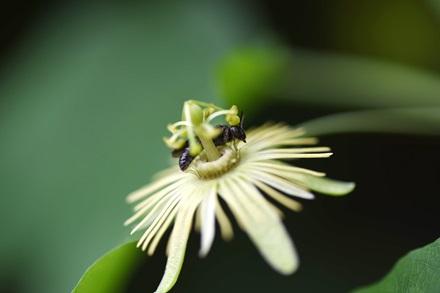Studying A Notorious Pollen Thief

The passionflower bee on a yellow passionflower. (Photo by Katherine Parys, ARS)
While many bees play important roles in pollinating crops, the passionflower bee, Protandrena passiflorae, is considered the self-serving friend of the bee world.
This small solitary bee, which is approximately 7.5 to 8.5 millimeters in length, is part of the Andrenidae bee (also known as mining bees) family. This passionflower bee forages exclusively on yellow passionflower, Passiflora lutea, a small vine native primarily to the southeastern U.S. with delicate and fragrant yellow flowers and a well-loved plant for gardeners. In return, the bee does, well, nothing to help plants, according to bee experts.
“This species of bee is really unique since it is one of the few truly monolectic or host-plant specialist species,” said Katherine Parys, a research entomologist at the ARS Pollinator Health in Southern Crop Ecosystems Research Unit in Stoneville, MS. “The passionflower bee is really a pollen thief. The females take pollen from the flowers to feed their larvae but likely contribute little to actual pollination. Due to this unusual behavior, we wanted to study its genetic makeup.”
Researchers developed a high-quality reference genome. This genome represents one of only a few published mining bee genomes and one of the first genomes for host-plant specialist bees.
Putting together the passionflower bee genome is part of the Beenome100 project, a first-of-its-kind effort to create a library of high-quality, highly detailed genome maps of 100 or more diverse bee species found in the U.S. Beenome100 is a collaborative undertaking led by ARS and the University of Illinois, with collaboration of researchers across ARS and universities in North America. The project aims to provide genetic resources that will help protect bee diversity and the critical pollination service that they provide and to facilitate future research.
According to Parys, bee diversity is essential for maintaining ecosystem functions and ensuring stable food production.
“This new high-quality genome will serve as a valuable resource for investigating the genomic basis of specialization behavior of bees and for providing a useful resource for studying pollinator health and conservation,” said Parys. “It will help with conservation of wild plants like the yellow passionflower that are important food sources for other insects, birds, and mammals.”
The genome is available in the National Center for Biotechnology Information’s database.
The genome was done in collaboration with the ARS Pollinating Insects Research Unit, the Daniel K. Inouye U.S. Pacific Basin Agricultural Research Center, the Beltsville Agricultural Research Center’s Bee Research Laboratory, and university research partners. — by Jessica Ryan, ARS Office of Communications.

